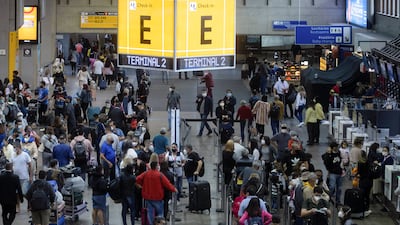An international fugitive wanted for people smuggling, document forgery and criminal association has been arrested in Brazil.
Pakistani citizen Attiq Ur Rehman was arrested by Brazilian police at the Guarulhos International Airport in Sao Paulo, Interpol said on Thursday.
It co-ordinated live travel intelligence, forensic data and crime analysis exchange with its bureaus in Brazil, Brussels and Paris.
Intelligence received by the international police organisation’s human trafficking unit led to its facial recognition system identifying Rehman as the subject of two alerts submitted by Belgium and France.
Brazilian authorities arrested the fugitive when he landed in Sao Paulo.
He was this year convicted in his absence in Belgium for smuggling people between Brussels, Pakistan and the Gambia in 2019 and 2020, and for purchasing, supplying and selling parts of forged travel documents – including blank visas and passport pages – to people hoping to enter the EU.
“The arrest of this dangerous fugitive demonstrates Brazil's commitment to international police cooperation and the effectiveness of its institutions in tackling the serious threat of human trafficking,” said Rodrigo Carnevale, head of Interpol's bureau in Brazil.
Rehman is also wanted by France to serve a five-year sentence for offences related to false documents.
“Rehman’s arrest as soon as he arrived in Brazil so soon after being detected travelling from Turkey is testament to the value of operational information exchange through Interpol channels, and the NCBs in Brasilia, Brussels and Paris are to be commended for their excellent work,” said Stephen Kavanagh, Interpol’s executive director of police services.
Brazil’s Supreme Court will now process the extradition request with a view to returning the fugitive to Europe to serve his prison sentences.
Interpol’s facial recognition system contains facial images from 179 countries.
Almost 1,900 terrorists, criminals, fugitives, people of interest or those missing have been identified since the launch of the system in 2016.


